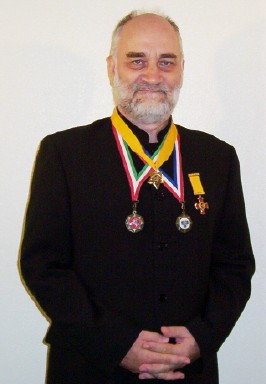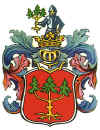
|
Restoring Lithuania's Royal Titles by Dr. Anthony G. Ziagos Changes in economic and political philosophy around the world has shifted the leadership of many countries from a Monarchy to Democracy. The United States was just a youngster, a newly formed county, and Europe was in turmoil. The 21st century is a very different world today than it was two hundred and fifty years ago. There are dozens of former rulers in exile. It has been reported by the Constantian Society there are over sixty non-reigning Monarchies today. What of the Royal Families? Based largely in Europe and Far East some of the ruling royal families are still wealthy and powerful. They are philanthropic and excellent benefactors to the people and countries they rule. Others are largely ceremonial or constitutional monarchies existing in a complimentary relationship respected and revered but holding little or no ruling power. Then, there are the few who are fiscally irresponsible, cruel and tyrannical. Royal titles and nobility does not guarantee integrity, wealth or power. Royal titles are largely misunderstood in America since we generally do not acknowledge nobility and the system of the monarchs. Politics and poverty has no bearing on historical facts or blood relationship of royal families. People who are rightful heirs to titles may have lost their family wealth but their titles and the right to rule a kingdom is usually hereditary. HRH Prince Roman Dambski of Lithuania, living in exile in Australia, is attempting to restore his family rights and titles. He was empowered by Princess Paulina Gedroyc, daughter of Grand Duke Wladislaw Ignacy Marek Gedroyc, in November 1992 prior to her death. Historically, The Kingdom of Lithuania is rooted in the 13th Century when Mindaugas was crowned by Pope Innocent IV as King of Lithuania. Over the next five hundred years the storms of war and politics rendered its toll. Expansion and alliances with Poland and other nations, were not strong enough to keep the transformed Grand Duchy of Lithuania independent. In 1795 it was all but consumed by Russia. After two centuries, in 1918 the strong will of the Lithuanian people gained independent statehood but this was also short lived. Twenty years of autonomy again ended with Russian occupation. Today the Republic of Lithuania declared Independence (again) as a parliamentary democracy on March 11, 1990 and was recognized by the Soviet Union on September 1991. The President of Lithuania is an American born Valdas Adamkus was elected by the people in July 2004. HRH Prince Roman states in a recent letter to me; “In 1993 Grand Princess Paulina died, and by letters patent Prince Roman II was recognised as "Grand Duke of Lithuania". In 1994, while the Russian Communist influence was still felt in Lithuania, Prince Roman II was invited by Dr Jonas Stankus to attend a world congress of Lithuanian nobility in Vilnius. Around 400 people attended, over double the number who attended the gathering in 1996 which produced the present Lithuanian Nobility Society (LRUN), which uses the name Royal, but has no Sovereign. Prince Roman was appointed a founding Senator of the newly formed Lithuanian Royal Nobility Society (LBKS) on 23 April 1994, but was subsequently snubbed by the 1996 society. Although accepting the Polish historical lineage by default, the LRUN does acknowledge that Lithuania was a Kingdom. It is that Kingdom which the present Sovereign Grand Duke Roman seeks to restore in its fullness.” HRH Prince Roman feels it is his birth right and privilege to assume the role as Lithuania’s Sovereign. “The Sovereign will not interfere with the function of the elected government/s, and seeks proper acknowledgement of his Sovereignty”, states HRH Prince Roman. He sees a constitutional monarchy similar to that of the British. He encourages all Lithuanians, Belorussians and Ukranians everywhere to support him in his noble cause. Page two of two
No one alive today remembers the royal families in Lithuania. Several sources I contacted could not agree on the validity of his claims or his family rights. One source has indicated his maternal rights made him a candidate for the Lithuanian Royal Nobility Society (LBKS) but suggested there were others who had a more direct connection. Of the 33 ruling monarchs around the world 7 of them are in dispute over who is more qualified to be the head of the household. One educated Lithuanian scholar, here in the U.S.A. commented that a monarchy might be nothing more than a curiosity. He did not feel the historical family achievements and their rights were as important as what an individual might accomplish during his/her lifetime. Yet others have indicated all genuine descendents from the elected Polish monarchy were deceased and proof of blood lines was not possible. Given enough time and spend enough money and you will get an answer that a majority might agree on. Over the last fifty years it seems every time someone makes a claim as the head of a Royal household there are a group of separatists and elitist who deny their validity and question their rights. But still the monarchist persists in their quest for restoration of family rights and titles. © 2004 Middlesex Media Exchange
Dr.
Anthony G. Ziagos, Sr. is a publisher and photojournalist from
Massachusetts. He is a licensed Doctor of Naturopathy and is
currently serving as the Charge D'Affaires for New England - USA, of
the Hutt River Province Principality located in Western Australia. He
is also Deputy Member of the National Assembly and Minister
Delegate for the Commonwealth of Massachusetts for the International
Parliament for Safety & Peace, an Intergovernmental
Organization
based in Europe and Adido Consular for the Albanian Consulate in
Brazil. He can be reached at: www.MiddlesexMedia.com
(Posted October 2005) 2000 © Hellenic Communication Service, L.L.C. All Rights Reserved. http://www.HellenicComServe.com |


